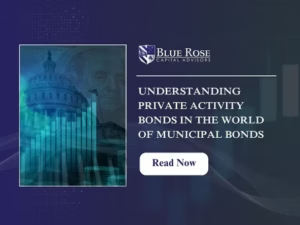What are Private Activity Bonds?
Private Activity Bonds (“PABs”) are a specific type of municipal bond (“muni bonds”) where the ultimate borrower is often a nonprofit private entity. PABs allow these nonprofit organizations to issue tax-exempt bonds through conduit issuing authorities, unlike state and local governments that issue tax-exempt bonds under their own authority. PABs provide these entities an important vehicle for funding capital projects at a lower cost of capital than the taxable bonds market.
How do Private Activity Bonds Work?
When tax-exempt bonds support projects with significant private involvement — such as private colleges and universities, hospitals, museums and cultural centers, affordable housing developments, and others — they may qualify as Private Activity Bonds if they are deemed to provide some public benefit. In these instances, while the government entity is the conduit issuing authority, a private nonprofit is the ultimate borrower and “obligated person,” that is, solely responsible for repaying the debt service of the bonds. The authority to issue tax-exempt bonds passes through the government entity to the nonprofit borrower, hence the term “conduit borrowing.”
IRS Rules and Limitations on PABs
The Internal Revenue Service (“IRS”) determines the criteria by which tax-exempt bonds issued in this manner are deemed to be PABs. One criterion is the private business use test, which requires that a nonprofit borrower uses more than 10% of the proceeds. The second criterion is the private security or payment test, whereby more than 10% of the repayment of the bonds, directly or indirectly, is made by or secured by the nonprofit entity. Many nonprofit borrowers like private colleges and universities borrow via PABs at levels that well exceed these thresholds.
In addition, private use unrelated to the nonprofit entity (e.g., a private business running a coffee shop within a new student housing facility financed by PABs) is capped at 5%. The IRS places other potential limitations on PABs, too. Each state has a cap on the volume of tax-exempt PABs it may issue annually, known as the volume cap. Certain PAB uses are not subject to the volume cap, including airports, high-speed rail, and 501(c)(3) bonds, among others (see here for the full list). Furthermore, the sum of the total costs of issuance (underwriter’s discount, fees for rating agencies and counsels, trustee fees, etc.) that may be funded by PABs is limited to 2% of the proceeds of the bond issue.
PABs also must receive governmental approval from either a voter referendum or by elected officials per the Tax Equity and Fiscal Responsibility Act of 1982 (“TEFRA”). If the latter, a TEFRA hearing must take place, including submission of a public notice at least seven days before the hearing.
From the bondholder’s perspective, interest on many private activity bonds are subject to the alternative minimum tax (AMT), with notable exceptions, including hospitals and non-profit college and university bonds.
Reach out to an Advisor!
Private Activity Bonds remain an important source of capital for U.S. nonprofits, from private colleges to museums to airports, and allow non-governmental entities to develop facilities and infrastructure in support of their local communities. If your organization is a private nonprofit looking to access the public capital markets, talk to your Blue Rose advisor today.
Find out how Blue Rose can serve your nonprofit institution with comprehensive financial consulting: https://blueroseadvisors.com/non-profit
Meet the Author:
John Elliott | [email protected] | 312-332-1336
Mr. Elliott serves as Vice President and Chief Compliance Officer at Blue Rose. He provides analytical and research support and project management for Blue Rose’s P3, strategic consulting, and debt advisory practice. Mr. Elliott joined Blue Rose’s California office in 2021.
Prior to Blue Rose, Mr. Elliott worked as a research associate for a non-profit think tank in Washington, DC and as a compliance consultant for federal contractors.
About Blue Rose Capital Advisors:
Blue Rose Capital Advisors is an independent financial advisory firm that serves the higher education, healthcare, non-profit, government, and corporate sectors. Blue Rose provides debt, derivatives, reinvestment, strategic and financial consulting services, and other specialized services to help clients achieve their goals. Blue Rose is registered as a Municipal Advisor with the Securities and Exchange Commission (SEC) and Municipal Securities Rulemaking Board (MSRB).
Blue Rose brings expert guidance and transparency to the often complex and opaque sectors of the capital markets. We embrace a client-first approach and work tirelessly to strengthen their debt transactions, governance, and balance sheets. With our wealth of real-time data, sophisticated modeling capability, and deep industry relationships, we can deliver solutions to almost any financing challenge.
Contact Blue Rose today:
Media Contact:
Laura Klingelhutz, Marketing Coordinator
952-208-5710



